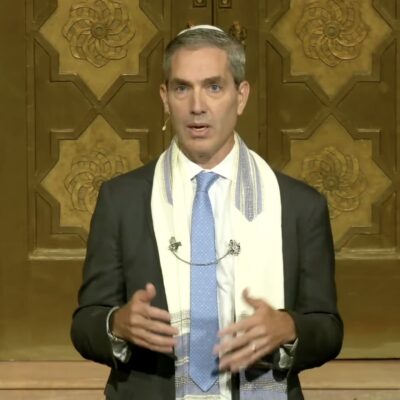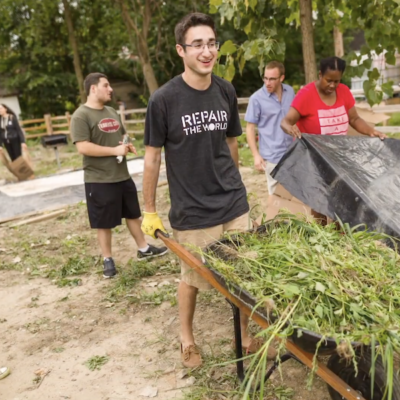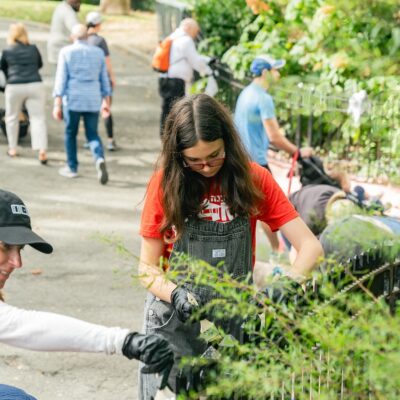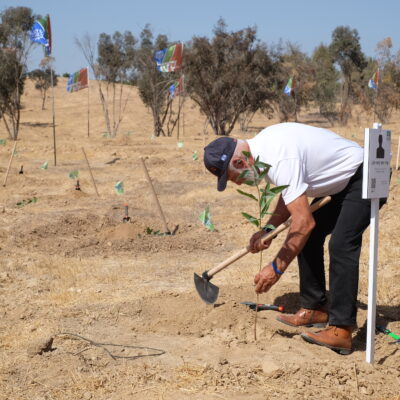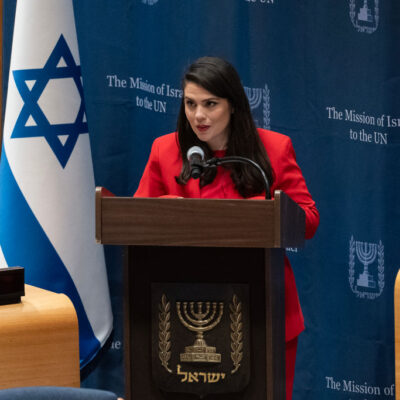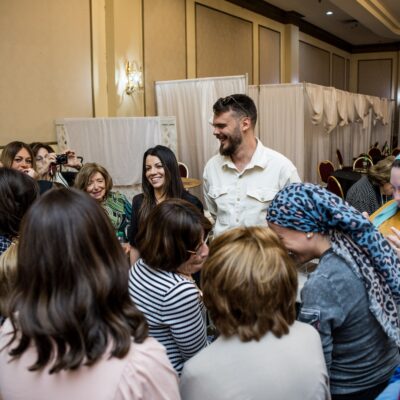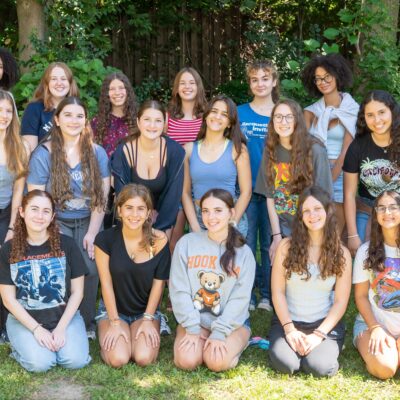Funding Women Creates Transformative Change

By Barbara Dobkin
In 1993 I founded Ma’yan: The Jewish Women’s Project at the JCC on the Upper West Side with Eve Landau who served as its ED. We were feminists, determined to be a catalyst for change for women in the Jewish community.
I was coming into my own as a feminist donor/activist, though not ready to label myself a philanthropist. Looking at the landscape, I was well aware of the dearth of money going to other women’s organizations, and I did not want them to fear that Mayan would compete with them for scarce funds. I believed that women were starting to wake up to the need to fund women and girls, and that Ma’yan could play an important role in expanding the circle of feminist donors. To help make that happen, I decided to be the sole funder of Ma’yan and to reach out to engage and recruit women donors.
Ma’yan designed several excellent conferences with follow up programs on women and money. While they were all well attended, they did little to persuade women to step up boldly to fund Jewish feminism. The reluctance of women to pursue the philanthropic agenda was in stark contrast to their enthusiasm for participating in and replicating our groundbreaking feminist seders and incorporating feminist material into their homes synagogues, and organizations and communities.
Ma’yan was not the only organization that was rewriting the Jewish story from the women’s perspective. A year after Ma’yan was founded, the Jewish Women’s Archive was established in Brookline MA. I served as its founding chair. Our goal was to create a history of the Jews that reflected the experiences and accomplishments of all the Jewish people, women and men. I was quickly joined in this new innovative venture by other woman donors who were excited about the potential to shape a new narrative of Jewish life. Despite the serious discrepancy we were trying to correct, we found it difficult, if not impossible to attract the level of funding that this bold venture required.
Still despite ongoing fundraising challenges, other women’s projects were born: Kolot, founded by feminist philanthropist, Sally Gottesman at the Reconstructionist Rabbinic College that eventually evolved and became an independent organization, Moving Traditions; the Jewish Orthodox Feminist Alliance; and the Hadassah Foundation, established with a $10 million endowment by Hadassah to address the needs of women in Israel and Jewish girls in the States.
Finally, we thought we were about to have a serious breakthrough in funding from mainstream donors when United Jewish Communities established the Trust for Jewish Philanthropy to secure funds for projects of interest to donors that were outside the purview of Federations. In 2001 with my one million dollar gift, Advancing Women Professionals and the Jewish Community was founded by Shifra Bronznick. In partnership, the Trust committed to raising an additional four million dollars for the project. In the end, only $175,000 by the Trust was raised, and in 2003 the Trust precipitously folded. Procuring the funds we needed for AWP continued to be a struggle, but our achievements were innumerable, including the cultivation of hundreds of women who were equipped to lead and advance systemic change, the expansion in perspective in the community about women and thought leadership, the policy shift in regard to paid leave and workplace flexibility, and the increase in the number of men willing to advocate for gender equity. In 2015, AWP implemented the “exist strategy,” a purposeful plan to cease operating as a standalone organization and to transfer responsibility to its robust network of allies. Many of these dedicated and effective women and men were well prepared to assume the mantle of leadership and are doing so.
During this same period, Jewish women’s funds were being formed. Most were established as endowments within their Federations. As they became a force for change, the Dobkin Family Foundation began funding an annual conference, gathering them for shared learning, expanded visibility and collaboration. The Jewish Women’s Funding Network was created. Presently there are 25 member organizations engaged in social change fundraising, advocacy and grantmaking to change the world for women and girls,
On the other side of the ocean, in 2003 the Dafna Fund, Israel’s first and only feminist fund, was established with a gift of one million dollars by Dr. Dafna Israeli who was a beloved feminist academic and activist.
The Fund invested strategically in gender mainstreaming and fostering women as agents of social change and was a decisive force in raising awareness of the robust feminist activity in Israel. Over those fifteen productive years, I donated a million dollars to the fund, and we were able to raise some additional money, mostly from our board members. This was not from a lack of trying to expand our donor base. As we recently sunset, the Dafna Fund and the National Council of Jewish Women sponsored a research paper and conference on the status of the women’s arena in Israel. The needs remain overwhelming and the creativity about ways to address gender issues is vibrant. What is required is adequate funding.
And all of these are not the only organizations that address issues facing women and girls in our community. Some are veteran, some are newer and more innovative. Some survived, even flourished, others did not. But what all of them have in common is their continuing challenge to raise the funds necessary remain sustainable.
Some philanthropists have told me that if you fund an organization for three years and it hasn’t become sustainable, it wasn’t worth the investment. Really? Those are the same people who provide capital to for profit ventures and know that sustainability requires long-term investment. Some say that perhaps we no longer need these single sex ventures. Look around and tell me, with everything we see happening inside and outside of the Jewish community that these organizations are no longer relevant – that we don’t need other new organizations and initiatives like Yeshivat Maharat, Sacred Spaces, Leading Edge or Created Equal: Men, Women and the Ethics of Shared Leadership at the Shalom Hartman Institute. And now there is the nascent Safety Respect Equity Coalition which promises to engage major Jewish community funders, service providers and subject-matter experts to discuss how to change the way our community deals with issues of harassment, pay inequity and the dearth of women leading our communal organizations.
For decades I had faith that funding feminism – investing serious money into important ideas – would create transformative change. Indeed, many of those ideas became institutions that have far reaching impact.
I am not surprised by women’s accomplishments in spite of the woefully inadequate support they receive. Women have always needed to be resourceful. Lilith Magazine, more than 40 years-old, still publishes in print four times a year and online every day on a budget of less than $600,000 annually. It is attracting a whole new readership of young women looking for Jewish feminist content.
Right now there is an explosion of young, smart women in every sector of the Jewish community taking on leadership of these organizations with their visions and energy. We cannot afford to have these talented women become discouraged and burn out.
Thankfully, once again, I am heartened by the potential for a breakthrough in funding: the Genesis Prize. This year, for the first time the Genesis Prize honors female recipients, Ruth Bader Ginsberg and Natalie Portman, and the funds from the prize will be used to support women’s organizations doing cutting edge work in Israel and in the U.S.
The call for proposals went out in Israel first, and an overwhelming number of requests for projects that demonstrate women’s ingenuity, passion and ability to change the world were submitted. A million dollars will be distributed in Israel. Just last week the U.S. tranche was announced – another million dollars – which is expected to be matched. Three million dollars in total. Still not a huge amount of money. But perhaps as the Genesis Prize, a very mainstream, high profile philanthropy, shines the spotlight on women, it will encourage a sea change in the Jewish funding world. I fervently hope so.
For too long, people in our community have relegated the job of funding women’s projects to women alone. The result has been a serious lack of support. Yet institutions like the World Bank and the IMF have proven that projects led by women and girls benefit everyone. Add this the well documented evidence which demonstrates that funding women creates positive change for our entire society, and you should be convinced, as I am that the time has come for everyone to fund women.
Right now many organizational leaders and funders are reeling from discovering what many feminists always knew: that sexism is rooted deeply our communities and institutions. What feminists also know is that there are real solutions to the challenges we face. Let’s invest in them and do it not only with a full heart, but also with a full wallet.
Barbara Dobkin is a philanthropist and activist in both the Jewish and secular worlds. She has been recognized for her work on behalf of women and girls. She lives in New York City.

 Add EJP on Google
Add EJP on Google